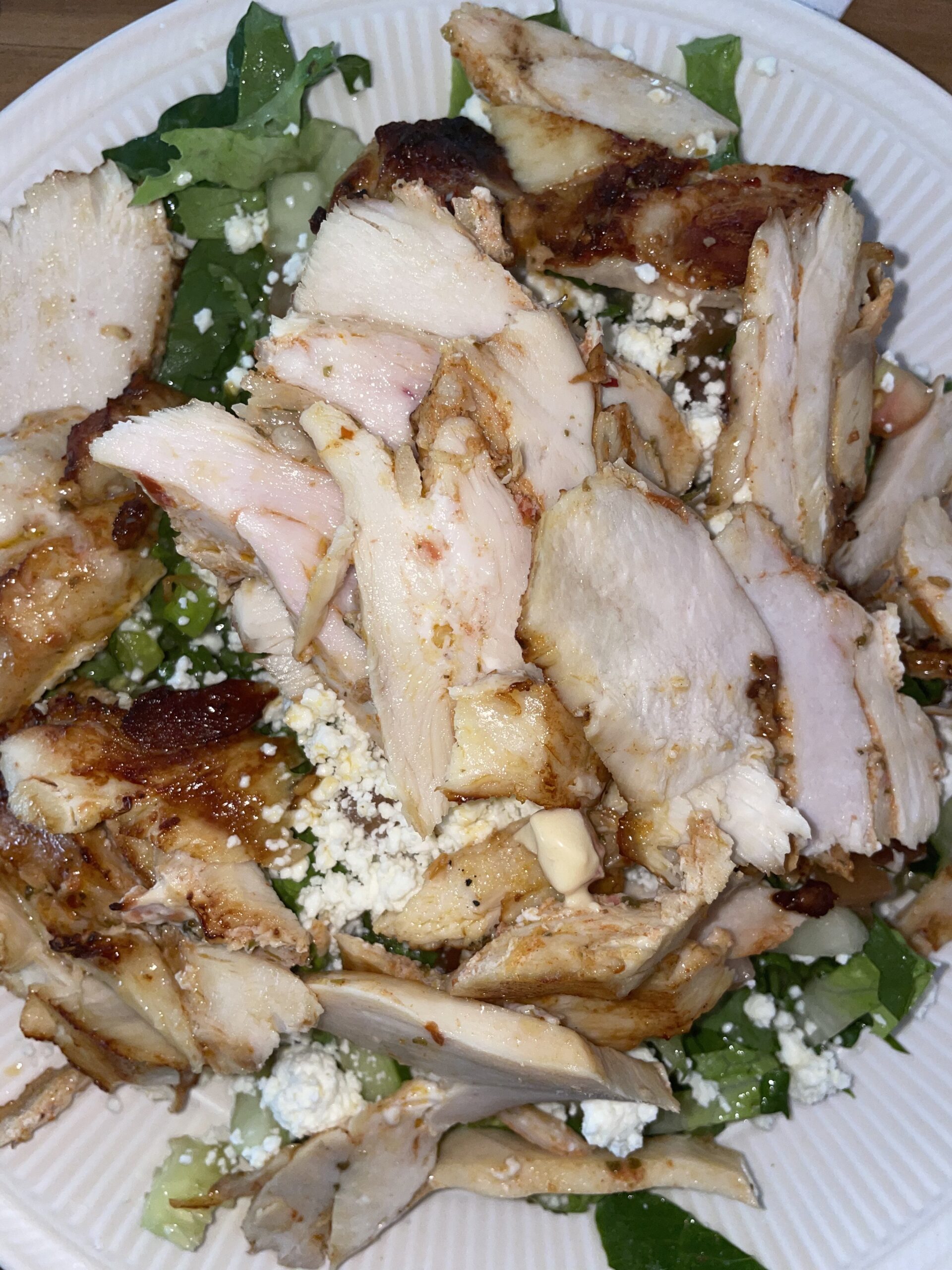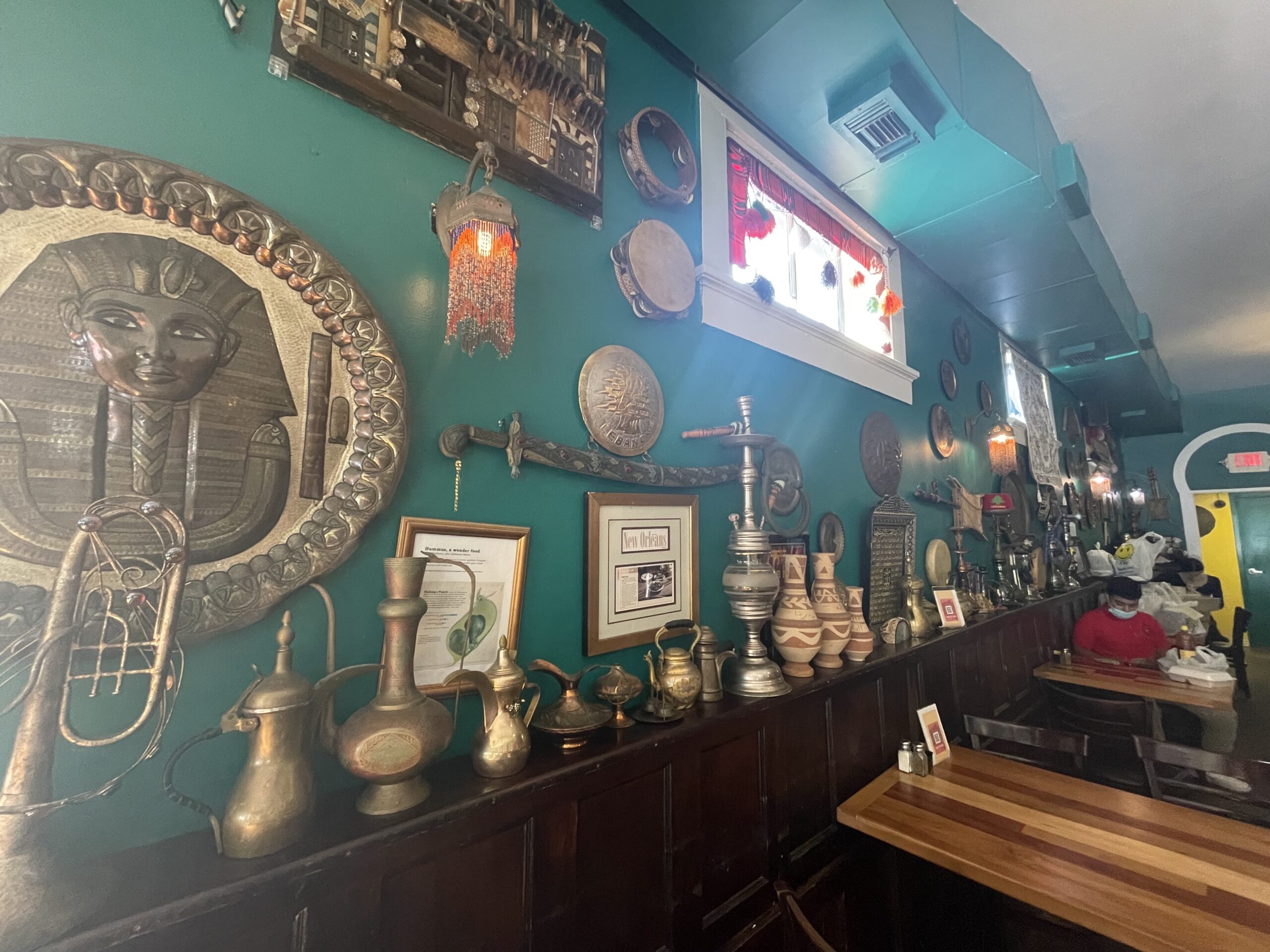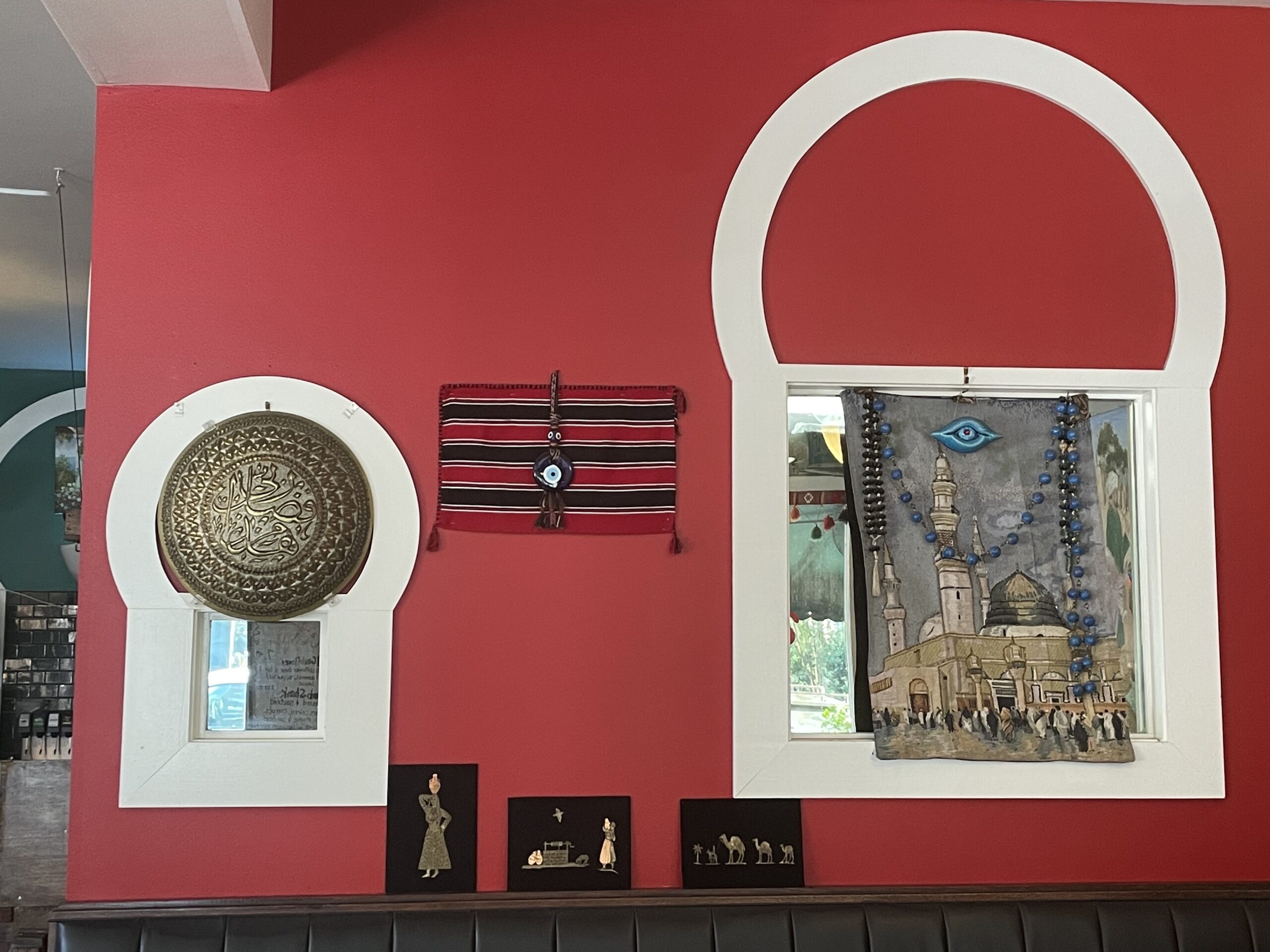What lengths would you go to to eat at your favorite restaurant? I’ll go first: I skipped class and walked through a rainstorm to my favorite restaurant in hopes of devouring a steaming plate of chicken shawarma along with sides of hummus, labneh, grape leaves and pita at my favorite restaurant. I drove 66 miles from Pass Christian, Mississippi, to uptown New Orleans to eat this meal at Lebanon’s Cafe. Sure, there may be food at home, but Lebanon’s promises a meal and dining experience that offers a sense of authenticity that I cannot seem to find elsewhere.

According to its website, “Lebanon’s Café has earned a solid reputation as the #1 Middle Eastern dining destination in New Orleans.” (Image by Gabi Liebeler)
According to Hanne Laceulle, in its most general sense, “authenticity means that something or someone is ‘faithful to an original’ or is ‘of undisputed origin or authorship.’” Laceulle’s idea of faithfulness as inherent to authenticity suggests that something authentic devotes itself to the ideals present in the original, much like a faithful person devotes themself to a religion.
Applying this definition of authenticity, an “authentic” restaurant is one whose cuisine and atmosphere most closely resembles that which it claims to be. Lebanon’s Café, situated on the corner of South Carrollton Ave. and Jeannette St., has “earned a solid reputation as the #1 Middle Eastern dining destination in New Orleans.” Lebanon’s claims to resemble middle eastern – specifically, Lebanese – dining.
Much like a faithful follower, Lebanon’s decor shows its devotion to its Lebanese roots. The decor imitates that of a middle eastern market, in which a traveler would immediately see printed rugs and tapestries, trinkets and goods. These markets are often covered and dimly illuminated.
Lebanon’s is spacious, filled with multicolored wood tables and chairs and red and green printed tapestries with white tassels that cover dark leather corner booths. Artificial lighting is sparse, as the restaurant is lit by bronze chandeliers, beaded red and blue lamps, or the occasional crack of natural lighting through bamboo shades. The color of the walls switches from a forest green to a rich red while a mural, depicting an ancient middle eastern scene, sprawls across the side wall. Patrons dine before a picture of travelers and merchants, horses adorned with colored cloths, baskets overflowing with food and instruments in front of palm trees and street houses.
If you sit in front of this muraled wall, your eyes will flit to the wall opposite. While the wall behind you depicts an ancient market scene, the one before you is completely covered with decor and trinkets you would find in a middle eastern market today. From the middle of the wall all the way back into the hallway that houses the bathroom, you will discover fez hats, engraved silver plates, urns, paintings, tambourines, newspaper articles, hookahs, and even a sword plastered on this dark green wall. When you glance around the edges of the restaurant, you will notice numerous evil eye charms, bronze urns and vases and art, often depicting Egyptian figures.

Lebanon’s Cafe honors its Lebanese roots in its decor, which includes historic Middle Eastern urns, tapestries, tambourines, fez hats, hookahs and even swords.
Lebanon’s atmosphere marks a stark contrast from the lively New Orleans neighborhood that surrounds it. A patron looking out the large front windows of the restaurant will see the streetcar chugging along South Carrollton, pedestrians, runners and dog walkers. One will likely hear live music from Bourrée next door. Lebanon’s clearly differentiates itself from a typical New Orleans scene like the one immediately outside. However, Lebanon’s Cafe is neither in Lebanon, nor is it an actual Lebanese marketplace. Although it is heavily influenced by places, it is a replication. Can something replicated ever be authentic, or is this label only reserved for an original?
In her article, Beth Blum addresses this complication using Elizabeth Outka’s idea of the “commodified authentic”: “the paradox that while the commercialization of authenticity makes it accessible to the masses, its resistance to commodification is precisely what constitutes the authentic’s appeal.” When we discuss authenticity, we must be aware that some objects, spaces and ideas masquerade as authentic for the purpose of profit. As a result, we must be able to discern the real from the fake. According to Outka’s theory, maybe we can tell the authentic apart from the inauthentic by analyzing whether something is resistant to the fate of being bought or sold, or whether something can be seen as inherently valuable rather than monetarily valuable.
Lebanon’s Cafe does not adhere to this definition of the commodified authentic, and we see its true authenticity in its menu and food. If it were to fall under the commodified authentic, Lebanon’s would overcharge for their cuisine and profess its adherence to true Lebanese cuisine primarily through words. Instead, it shows through its products and allows patrons to decide the degree to which they find their meal to be true to the Lebanese experience. Google reviews remark: “What a restaurant! Was served a delicious, generous portion of authentic chicken shawarma within 2 minutes of ordering,” “Great middle eastern fare. Well prepared and presented friendly wait staff and reasonable priced,” “This is the real deal. I have had all of their meats on the menu, not one disappointed. This is one of those great hole in the wall places that you always hear about and are lucky enough to dine there.”
Traditional Lebanese cuisine is simple; food is cooked by grilling, frying, or baking, and is elevated with essential middle eastern spices like sumac, za’atar, and flavors of fresh lemon, pomegranate, rose, tahini, parsley and olive oil.
Lebanon’s menu is one page, double sided and about as straightforward as it gets. Listed are dishes like “Hummus with Fried Cauliflower and Pomegranate Sauce,” “Hummus Musabaha,” “Baba Ganuj,” “Labna,” “Zaater Bread,” “Halloumi Cheese,” “Yogurt Salad with Cucumber,” “Shish Kabob Dinner” or “Shawarma Dinner” (your choice of chicken, beef, lamb, or specialties of each), “Lebanon’s Famous Iced Tea,” “Baklava,” and “Jordan Almonds.” Prices range from about $5 to $35.99, the most expensive dish being the “Rosemary Lamb Chops Dinner.” Lebanon’s website notes: “All of our kabobs are ethnic to the Middle East. They are cooked on skewers over a charcoal grill and removed from the skewers before serving.”
The restaurant prides itself on the quality of its food. The previous quote is the only mention of their cooking processes, likely because on the walk back to the bathroom, one can see the meat being rotated on large skewers and before being sliced. Since I have begun dining at Lebanon’s – a little over a year ago – the price of a meal has remained the same at around $25. It appears as though Lebanon’s Cafe relies on a dedicated customer base and word of mouth to bring in profit, rather than trying to advertise.

While Lebanon’s is not a Lebanese marketplace and is not in Lebanon, its menu and environment are faithful to its origins, rendering it authentic, despite being a replication. (Image by Gabi Liebeler)
Lebanon’s Cafe is, by nature, a restaurant that replicates and imitates a Middle-Eastern atmosphere while serving dishes that are truly Lebanese. However, certain Eastern philosophies state that replications hold authenticity, turning on its head the idea that copies are any different from an original. Professor Byung-Chil Han, in his article, “The copy is the original,” gives Western readers an idea of what this philosophy entails. Han describes the Ise Grand Shrine, a Shinto sanctuary on Honshu island. To the Japanese people who visit the temple on a pilgrimage each year, the temple is 1,300 years old. However, this temple is rebuilt every 20 years. Han points out that with age, any object deteriorates so that it is physically much further from its original state. Restorations and updates serve to bring that object closer to its original, even though this process naturally implies change. A “copy” is defined as “a thing made to be similar or identical to another.” Lebanon’s is the sort of copy that is made to be similar to a restaurant or marketplace in Lebanon. The food and the atmosphere experienced at Lebanon’s, while not exactly identical to what it copies, bring the restaurant closer to its inspiration.
By this definition, Lebanon’s Cafe is authentic, despite the fact a Lebanese restaurant in New Orleans. Lebanon’s will never actually be a bustling marketplace filled with Lebanese street food. However, the restaurant is an unapologetic ode to its origins. Despite not being the original, its attempt to copy essential elements of the Middle-Eastern dining experience in decor, flavor, food and process is well-understood and appreciated by patrons – like me – who will walk through rain or drive from out-of-state just to sit at their favorite booth with some of their favorite people to eat their favorite food.
 NOLAbeings Multimedia artist Claire Bangser created NOLAbeings as a portrait-based story project that marries...
NOLAbeings Multimedia artist Claire Bangser created NOLAbeings as a portrait-based story project that marries...  Voodoo in New Orleans: Reviving history: New Orleans fortune telling This article takes a deep dive into the history of Voodoo in New Orleans, its hybridization with Catholicism, and its present-day place in the city's culture. The author visits fortune-tellers in the French Quarter, using their guidance as a tool for introspection rather than a deterministic predictor of the future. Through her experiences in New Orleans, the author feels a mystical connection to both the past and the future.
Voodoo in New Orleans: Reviving history: New Orleans fortune telling This article takes a deep dive into the history of Voodoo in New Orleans, its hybridization with Catholicism, and its present-day place in the city's culture. The author visits fortune-tellers in the French Quarter, using their guidance as a tool for introspection rather than a deterministic predictor of the future. Through her experiences in New Orleans, the author feels a mystical connection to both the past and the future. 